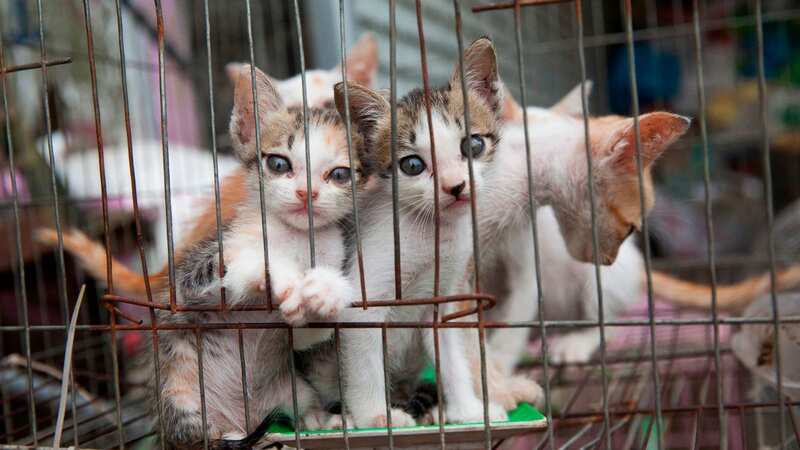

Earlier this year I reported on the horrors of how thousands of cats are being snatched from their owners in Vietnam before being sold for their meat.
It has been six months since my trip and although there have been movements in the right direction, a ban on cat meat consumption is still a way off. But as we near the end of the year, I wanted to share some good news.
Last week, 20 traumatised cats and kittens destined for the dinner table were given a second chance at life – after the slaughterhouse owner asked for help to close his business for good.
Pham Quoc Doanh, 37, has been running a cat-meat restaurant for the last five years in the Vietnamese city of Thai Nguyen, killing 300 animals a month to serve to his customers.
But he now admits his shame in participating in the “brutal” trade with a million cats a year killed to keep up with demand, many of them beloved family pets.
 Furious chimp launches bottle at girl filming him leaving her bleeding at zoo
Furious chimp launches bottle at girl filming him leaving her bleeding at zoo
Charity Humane Society International is now helping him get out of the industry and has rescued the cats which would have been cruelly drowned.
He said: “When I think of the thousands of cats I’ve slaughtered and served up here over the years, it’s upsetting.
“Cat theft is so common in Vietnam, I know many of the cats sold here were someone’s loved family companion, and I feel very sorry about that.
“For a while now I have felt a genuine desire to leave the cruel cat-meat business and to switch to something else as soon as possible.”
The closure of Pham Quoc Doanh’s business and the rescue of the cats is part of HSI’s Vietnam Models for Change programme, which was launched in the country last year.
So far, two dog and one cat slaughterhouse/restaurant in Thai Nguyen have been closed down.
The charity watched as Doanh tore down his “cat- meat” signage, symbolising his exit from a barbaric trade.
The 20 terrified animals are now being cared for and will be found homes, and a one-off payment has been provided to help Doanh set up a store.
Quang Nguyen, HSI’s Vietnam companion animals and engagement programme manager, said he hoped the closure would be the first of many as more owners “turn away from this cruel trade”.
He added: “Although most Vietnamese people don’t eat cat, the belief persists that consumption can cure bad luck, and the scale of the suffering is astonishing.
 Scientists plan to ‘de-extinct’ the Dodo and release it back into the wild
Scientists plan to ‘de-extinct’ the Dodo and release it back into the wild
“These 20 lucky animals have escaped and will be found loving homes, but our work continues to see a nationwide ban on the cat-meat trade that brings such pain and distress to so many.”